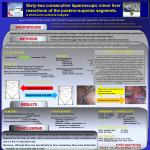Bruto Randone, MD PhD, Renato Costi, MD PhD, Oriana Ciacio, MD, Vishal Gupta, MD, Brice Gayet, MD. Département de Pathologie Digestive, Institut Mutualiste Montsouris, Université Paris Descartes, Paris, France; Dipartimento di Scienze Chirurgiche, Università degli Studi di Parma, Parma, Italia.
Introduction
Despite the recent diffusion of laparoscopic liver minor resections (“wedge” and segmentectomy), their feasibility in the case of lesions located in the postero-superior liver segments (I, IVa, VII, VIII) is still under debate. In fact, recent articles suggest that major resections should be preferable in those cases.
Methods and Procedures
In order to assess feasibility and short-term outcome of laparoscopic elective minor hepatic resections of postero-superior segments, a retrospective analysis of a prospectively maintained database including all consecutive patients undergoing such procedures until 2008 was performed.
Results
From January 1996 to December 2008, 62 laparoscopic elective minor liver resections of lesions located in the postero-superior segments were performed in 53 patients (27:26 male:female ratio). Nine-teen patients underwent preoperative chemiotherapy (17 colorectal cancer metastases, 2 gastric GISTs). Mean age was 62±13 years (range 23-89). The series included 14 resections performed in liver segment I, 13 in segment IVa, 19 in segment VII, 16 in segment VIII. Indications for surgical resection were: metastases (41 patients), benign tumors (8) and hepato-cellular carcinoma (4). Mean tumor size and surgical margin were 37.6±11.1 mm and 4.4±1.2 mm, respectively. Mean operative time was 187 min (range 60-420). Mean blood loss was 370 ml (range 10-1800). Intraoperative transfusion was needed in 4 patients (7.5%). Seven procedures (13%) were converted to an open access; reason for conversion was bleeding (4 patients), adhesions (1), difficulty in tumor localisation (1), preoperatively misdiagnosed synchronous metastases (1). Mean intensive care unit stay and hospital stay were 0.5 and 11 days, respectively. Perioperative morbidity rate was 26% (14 patients). Four patients (7.5%) required further surgery owing to perioperative complications, including bleeding (2 patients), intestinal obstruction (1), biliay leakage (1). There was no perioperative mortality.
Conclusions
Elective laparoscopic minor resections of tumors located in the postero-superior segments of the liver are safe, with no perioperative mortality, a 26% morbidity rate and a 7.5% re-operation rate. Moreover, although they may sporadically be time-consuming, they seem technically feasible, as conversion rate is 13%.
Our results discourage performing systematic major liver resections for lesions located in postero-superior liver segments, whenever it is not deemed necessary for oncological reasons.
Session Number: Poster – Poster Presentations
Program Number: P366
View Poster
